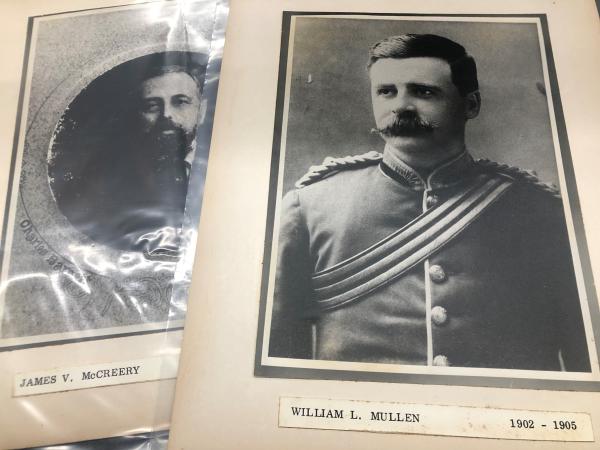
Author: Tara Oldfield
Senior Communications Advisor
New to our collection in July and August 2022, and now available for researchers to view in our North Melbourne reading room, are records from the Office of the Chief Parliamentary Counsel (1886 to 1980), Kew Asylum records including a photographic collection depicting the buildings, facilities and staff (1871 to 1980s), and probate records lodged and finalised by the Supreme Court in 2019.
Records related to Kew Asylum
Four new series of records related to the Kew Asylum have been transferred to PROV from the Kew Historical Society and Department of Health. These records include portraits of Medical Superintendents, a bound folio telling the history of Kew Children’s Cottages, register of patients and staff from 1969 to 1983, and a photographic collection.
The Kew Asylum was first opened in 1871 between Princess Street and Yarra Boulevard in Kew as a ward of Yarra Bend. It was one of the largest asylums ever built in Australia. In October 1872 Kew was proclaimed a separate institution from Yarra Bend.
The Children's Cottages at Kew were first opened in 1887 as a ward of the Kew Asylum, established to provide separate accommodation for children previously accommodated with adult patients.
The title of the Kew Asylum changed several times to reflect both the community's changing attitude towards mental illness and the Government of Victoria's approach to treatment. It was known as Willsmere Mental Hospital by the time it was decommissioned in December 1988.
The bound history contained within the new transfer of records includes typed research and timeline of the facility, statistics, parents’ association newsletters, and other notes and instructions. The book was compiled by Irene Higgins, a social worker at the Cottages and Kew Asylum from 1951 to 1968. Portraits also contained in the new transfer are stunning printed A2 black and white photographs with a white border that includes the name of the Superintendent and years of service; and the photographic collection contains fascinating photographs of the buildings, staff and some patients providing a snapshot into the workings of the facility over time.
| Records | Date range | Summary |
| VPRS 18804 Portraits of Medical Superintendents | 1970s-1980 | Formal photographs used for exhibition purposes of the medical superintendents of the Kew Asylum. |
| VPRS 18805 History of Kew Children's Cottages | 1954-1964 | A bound folio of original printed materials relating to the Kew Cottages. |
| VPRS 18806 Photographic collection | 1871-1980s | Loose photographs depicting buildings, facilities, staff and residents. |
| VPRS 18807 Numerical register of patients and staff | 1969-1983 | A single volume which provides a daily statistical report of the numbers of patients in residence, and the numbers of resident staff on duty. |
Office of the Chief Parliamentary Counsel bill files
The Office of the Chief Parliamentary Counsel is responsible for drafting all legislation enacted in Victoria. Other responsibilities of the agency include drafting regulations and rules made under Acts of Parliament; advising committees such as the Subordinate Legislation Committee and the Statute Law Revision Committee; and advising Judges of the Supreme Court and County Court in the preparation of Court Rules.
Recently transferred to PROV are Parliamentary Counsel Bills from 1874 all the way through to 1980. Each of the 375 files transferred, on open access, relate to a particular Parliamentary Bill and include drafts, amendments, notes and related correspondence and papers. Bills include The Brands Act 1915 to 1937, The Railways Advances Act 1921, The Trade Unions Act 1886, Landlords and Tenants 1886 to 1933, and Indecent Publications 1899 to 1913, just to name a few.
| Records | Date range | Summary |
| VPRS 10265 Parliamentary Counsel Bills | 1874-1980 | Original drafts and amendments of Parliamentary Bills all or most of which incorporate ministerial notes, comments, correspondence and related papers. |
Probate records
Probate records contain documents received or created by the Supreme Court certifying the deceased’s will’s validity and confirming the appointment of an Executor to administer the estate. Letters of Administration is the Court's approval to administer the estate of a person who dies without a will. In most instances Letters of Administration will be granted to the next of kin of the deceased e.g. a spouse, domestic partner or a child of the deceased.
Probate records from 2019 have now been added to our collection, as well as various files from 2015 to 2018 finalised in 2019. These are available for copy requests or to order for viewing in our North Melbourne reading room.
You can search the collection on our wills and probates topic page.
Material in the Public Record Office Victoria archival collection contains words and descriptions that reflect attitudes and government policies at different times which may be insensitive and upsetting
Aboriginal and Torres Strait Islander Peoples should be aware the collection and website may contain images, voices and names of deceased persons.
PROV provides advice to researchers wishing to access, publish or re-use records about Aboriginal Peoples





